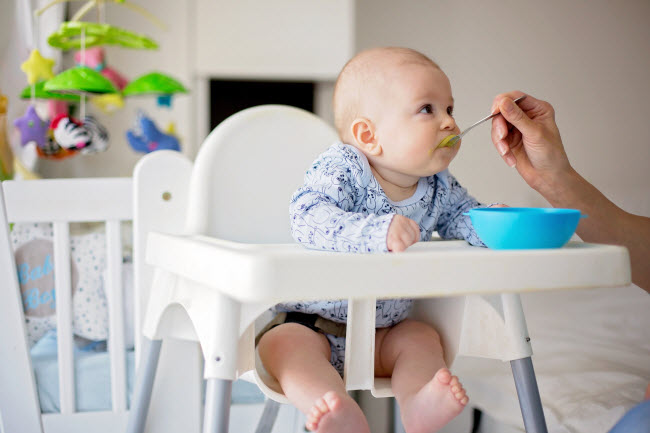If you have a baby, you likely were startled by an October 2019 study showing 95 percent of baby food containers that were tested had at least one of four toxic heavy metals — arsenic, cadmium, lead and mercury.
The study, commissioned by the Healthy Babies Bright Futures initiative, found that one-fourth of the 168 baby foods tested contained all four of these toxic heavy metals.
“Even in the trace amounts found in food, these contaminants can alter the developing brain and erode a child’s IQ,” the study warns. “The impacts add up with each meal or snack a baby eats.”
Samantha Radford, who holds a Ph.D. in analytical chemistry and runs the Evidence-based Mommy website, says it’s virtually impossible to avoid these toxic metals in our food supply. That’s because these metals are found in soil, Radford says, and anything that’s grown for us to consume — from apples to zucchini — comes from the soil. Therefore, you can’t entirely avoid these metals if you buy regular or organic baby foods or you make your own baby foods.
Thankfully, you can take steps to lower your baby’s exposure to arsenic, cadmium, lead and mercury.
1. Skip rice cereal.
Healthy Babies Bright Futures identifies rice cereal as the No. 1 source of arsenic in infants’ diets. As an alternative, try cereals with lower-arsenic ingredients like oatmeal and multigrain flour.
Your baby won’t be missing out on much by removing rice cereal from their diet, as it’s low in protein and high in carbs.
2. Ditch rice-based snacks.
Puffs and other snacks made with rice flour are loaded with arsenic, according to Health Babies Healthy Futures. Therefore, you should opt for rice-free packaged snacks. Even better, go with snacks like apples, unsweetened applesauce, bananas, beans, cheese, grapes, hard-boiled eggs, peaches or yogurt, the organization recommends.
3. Cut back on carrots and sweet potatoes.
While carrots and sweet potatoes supply vitamin A and other nutrients, Healthy Babies Healthy Futures says they’re laced with cadmium and lead. You can still put carrots and sweet potatoes on your baby’s plate, but be sure to add plenty of other fruits and vegetables to minimize the impact from cadmium and lead, the group says.
4. Be choosy about juice.
Healthy Babies Healthy Futures advises that apple, pear, grape and other fruit juices include arsenic and lead.
“Levels aren’t as high as in some other foods, but toddlers drink juice often, so it’s a top exposure source,” the group says.
To reduce reliance on juice, quench your youngster’s thirst with water or milk, Healthy Babies Healthy Futures recommends.
5. Ditch teething biscuits.
Teething biscuits seem innocent enough, but they frequently contain arsenic, cadmium and lead, according to Healthy Babies Healthy Futures. In addition, they lack nutrients and can lead to tooth decay. Instead of teething biscuits, doctors and dentists suggest teething-pain solutions like a frozen banana, a peeled and chilled cucumber, or a clean, cold wet washcloth or spoon, according to Healthy Babies Healthy Futures.
What else can you do?
Aside from making changes in your little one’s diet, you can sign a petition started by Healthy Babies Healthy Futures calling on the U.S. Food and Drug Administration (FDA) to limit the amounts of arsenic and lead in rice-based baby foods, particularly rice puffs.
“The FDA must set strong standards that require baby food to have no measurable amount of these heavy metals in children's food products, and companies must swiftly remove these toxins,” U.S. Sen. Richard Blumenthal, a Connecticut Democrat, says in a news release. “Anything short [of that] is a repugnant failure to protect children from irreversible health impacts during critical developmental years.”
Healthy Babies Health Futures notes that baby food companies are working to boost the safety of rice-containing baby food. For instance, levels of arsenic in infants’ rice cereal are nearly 40 percent lower today than what they were 10 years ago.
In the end, Radford says parents shouldn’t be “overly alarmed” by the metals-in-baby-food study, since “the metal content of baby food really isn’t any more elevated than all the other food that adults and older children consume every day.”
“While you may be hoping to create a perfect world for your baby, keep in mind that food contaminants can occur in any part of our food system. Also, pollutants are found in our air and water, and vary based on location,” adds Amanda Kostro Miller, a registered dietitian who sits on the board of advisers of the Smart Healthy Living website.




